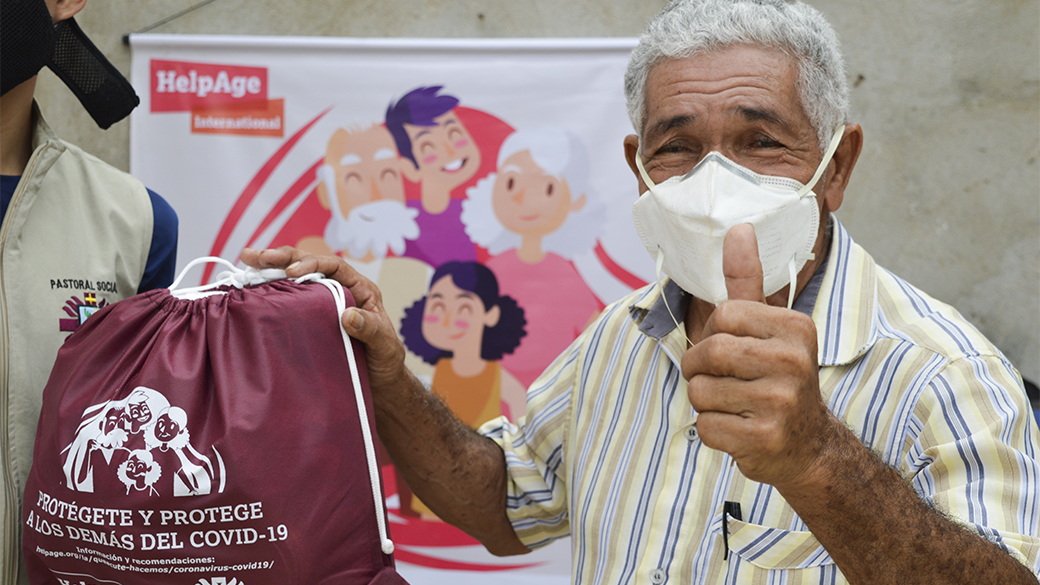The arid and over-crowded conditions of La Guajira on the Venezuela/ Colombia border are a potential death trap for the thousands of Venezuelan migrants living in temporary shelters in fear for their lives because of COVID-19 and the lockdown, says HelpAge International today.

Most at risk are the almost 5,000 older migrants living in La Guajira. According to a survey of the region – carried out by HelpAge in January 2020 – 84% of them have no handwashing facilities and 78% have no access to safe drinking water. This has not improved since the outbreak of COVID and creates serious obstacles to protecting a population at risk from the virus.
Self-isolation is almost impossible in La Guajira and there are no opportunities for quarantine. 75% of the older people have never even been consulted by a humanitarian NGO about their needs.
“The needs of the population were alarming at the beginning of the year but they have now plumbed new depths,” says Marcela Bustamante, Regional Representative for HelpAge International in Latin America and the Caribbean.
“Thousands of people thought that their lives couldn’t possibly get any worse than the circumstances they endured in Venezuela. But living as unsettled migrants in the harsh conditions of La Guajira and subject to the COVID-19 lockdown has left many of them much worse off, fearing death by the virus, compounded by the lack of health care and hunger.”
395 cases of COVID-19 have been reported in La Guajira, and there have been 18 deaths, but this is in a context where testing facilities are hugely limited. There are fears that the pandemic will spread easily in the area where people live in inadequate and crowded conditions with an acute lack of water and sanitation facilities.
Health and social services are at breaking point
“We are hugely concerned about COVID-19 breaking out in La Guajira. The health services were already buckling under the strain caused by the large numbers of people living in desperate circumstances. If COVID-19 takes hold, it will be chaos and potentially lead to a colossal loss of lives,” said Marcela Bustamante.
“The situation was already very tense but COVID-19 and new restrictions on movement have heightened the sense of insecurity and inequality. People who had fled to Colombia in search of a better life were living a hand to mouth existence which has been made worse because the lockdown has denied many people of whatever means they previously had to earn a living.”
Juanita (75) used to weave and sell back packs to tourists. Now, there are no tourists and she cannot get out to sell them. She has been forced to survive on one meal a day, which she says is still better than in Venezuela, where she struggled to feed herself and her family.
Milagros is an older Venezuelan woman who lives in Riohacha in La Guajira with her husband and four children. Before COVID-19, they earnt 0.80 USD per day through informal recycling. This had to stop because of the lockdown and they are now only able to afford one meal per day.
Milagros and her family left Venezuela last year because they could not afford their living expenses and health care for their children, who suffer from an underactive thyroid and visual impairments. Now they are living in a flimsy shelter and the children are malnourished and suffering from skin infections.
Joaquin Maparino (69) is suffering from nose bleeds and needs an operation. His son used to use his proceeds as a market trader to bring him food but that has now stopped as the market is closed. Joaquin feels desperate as he cannot afford the operation he desperately needs and is, instead, taking a natural medicine as a sedative to ease the pain. “I was planning to return to Venezuela,” he explained. “But now I can’t even move from here because everything is closed, including the border.”
So many are desperate to return. Marlene Canache (65) is currently living with her son in appalling conditions in an informal settlement. She left her home in Venezuela last year as she could not afford to eat but has not found life any better in Colombia.
“When I arrived in Colombia, I cried every day for two months asking God why, if we had a roof in Venezuela, do we have to live here with no work, sleeping on the floor, with no food, no house and no bathroom”, she said.
“The migrants living in La Guajira are caught between a rock and a hard place. They left their country because of the dreadful circumstances they were living in but now find themselves trapped by COVID in some of the harshest conditions imaginable. The situation is so bad that thousands want to return home but the Venezuelan government is restricting entrance at all boarders, except for the most extreme emergency cases. But many do not have the resources to travel and have no idea what their prospects would be in Venezuela,” said Marcela Bustamente.
HelpAge International joined forces with Humanity and Inclusion and Pastoral Social to support more than 7,000 people in informal settlements in La Guajira, including the elderly, disabled and indigenous people from the Wayu tribe.
This area typically receives very little or no support from humanitarian agencies but the Start Fund funded this project to provide clean water, water storage tanks and hygiene items. 112 families from migrant and host communities were also supported with unconditional and unrestricted cash transfers, prioritising older and disabled people and those with chronic diseases.
The project also provided psychosocial support for older people, as well as education and awareness on COVID-19 through radio programmes in Spanish and Wayunaiki which were accessible in the more remote areas.
END
